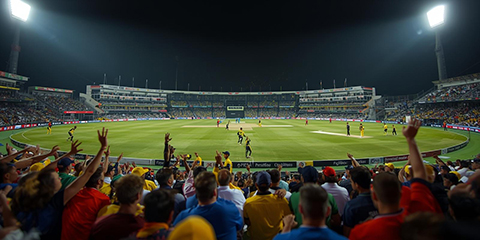Ramiz Raja's cricket legacy: The captain who chose dignity over dazzle in Pakistan's darkest hours
JournalismPakistan.com | Published: 24 September 2025 | Dr. Nauman Niaz (TI)
Join our WhatsApp channel
ISLAMABAD — I was but nine years of age when destiny, in its casual generosity, allowed me first glimpse of the figure who would one day become a constant thread in cricket's long landscape. My uncle had spoken with quiet excitement: Wasim Raja's younger brother, Ramiz, then no more than a hopeful for Pakistan's U-19s, was lodging nearby in Sialkot. I went to see him at the house of Mr. Ghaus Ratcher, a guardian of regional cricket, and took away little more than photographs, a thrill at proximity, and the simple wonder that this was Wasim Raja's brother. I could not have known that life, mischievous weaver that it is, was even then preparing finer connections.
The Maharajah of Cricket: Character Over Statistics
Years later, I would walk through the portals of Aitchison College, Ramiz's alma mater, and encounter the man himself not as the starry brother of Wasim but as a colleague, fellow traveller in the game's republic. Unlike the flamboyant Wasim, Ramiz was not to be measured solely by the square cut or the flourish of the bat. He was instead a quintessence of grace and integrity, educated, poised, suave, a man whom one could meet on the level ground of trust. Where Wasim dazzled, Ramiz reassured. Where Wasim evoked awe, Ramiz inspired relation.
I once set down an article upon him in 1992, an article christened Maharajah of Cricket, a title not innate of scorebooks but of the man himself. His runs, though serviceable, were never the truest reason he belonged to the game's memory. It was his bearing, the calm regality of his presence, that evoked such imagery.
From Commentary Box to Board Room: A Voice for Cricket
I encountered him often within the precincts of the Pakistan Cricket Board, in those days when he sat as a Member of the Advisory Council, later when the mantle of Chief Executive rested upon his shoulders. Fate, quirky conductor that it is, even placed us side by side in the commentary box, where we dealt not in cover drives or leg glances but in syllables, where words were bowled and metaphors caught. Later still, when I stood at the helm of PTV Sports, our paths entwined frequently, and always I found him unchanging, serenely decent, steadfastly poised.
Leadership in Crisis: The PCB Chairman's Compassionate Touch
When illness dimmed my horizon and shadows lengthened across my days, it was Ramiz again, as Chairman of the PCB after the ICC T20 World Cup, 2022, who extended his hand, not to speak of contracts or schedules, but of faith. His words were steady, pragmatic, humane. In that moment, the essence of the man shone most clearly: less as a cricketer, more as a man, more as a companion to life's harsher reckonings than to its scorecards.
The 1992 World Cup Hero: Beyond the Statistics
Truth obliges us to speak without varnish. Ramiz Raja was never the supreme batsman; his Test record modest, his centuries few, his bat seldom caressed by the radiance of immortality. Yet in the theatre of World Cups he discovered an arena fit for his spirit. In 1992, he was at once witness and agent of Pakistan's destiny. His runs carved out triumph, his centuries halted juggernauts. His name too is inscribed upon cricket's curious margins: the first man ever dismissed in One Day Internationals for 'obstructing the field,' twice walking when no-balls had already reprieved him, dismissals that endured the stamp of cricket's own eccentric humour.
The Voice of Cricket: From Bat to Microphone
Beyond the rope, however, his legacy grew taller than his statistics. He became Pakistan's most resonant voice. The microphone was his bat, the commentary box his crease. With the polish of an MBA, with looks refined and an image untainted, he stepped into living rooms across continents. He was no longer only an interpreter of cricket; he became its ambassador. His cadence was sought as much for its manner as for its memory, its refinement as much as its recall.
Mr. Clean: The Captain Pakistan Needed in Dark Times
Ramiz, less lion than steward, chose another path. His was not the destiny of dazzling batsmanship, but of guardianship, of the spirit of the game, of its dignity, of its voice. The mid-1990s brought his greatest transformation. Shahid Hashmi, writing in those years, observed his ascent to Pakistan's captaincy with tones befitting an epic. It seemed less the appointment of a player than the coronation of character. Here was a man whose record accepted no stain, whose integrity remained inviolate amid a landscape of shadows. In a country reeling from bribery allegations and scandal, weary fans found in him a figure of renewal. The press named him Mr Clean, a sobriquet as simple as it was sublime.
The Presidential Blessing: A Captain Chosen by Character
For four months, the nation had waited in breathless suspension, no captain, no selection committee, no direction. At last, in late August, the verdict came: Ramiz Raja, thirty-three years of age, summoned to lead. It was not the obvious choice. Only a year before, he had been displaced as opener by the brilliance of Aamir Sohail and Saeed Anwar. His runs no longer seemed secure in the ledger of Pakistan's batting. Yet the Board, in rare wisdom, sought not averages but character. They required not just a batsman, but a leader, a man of education, of common sense, of unsullied honesty. In Ramiz, they found all distilled.
Even the highest office in the country, the President of Pakistan, sanctioned the appointment. To fortify the new captain, the Board installed Majid Khan, patrician in bearing, as team manager, and Mushtaq Mohammad, the craftsman, as coach. Together, this triumvirate formed the foundation of renewal. Pakistan's image, long battered, thirsted for the balm of discipline, and Ramiz seemed born to administer it.
The Weight of Leadership: Pakistan's Thorned Crown
And yet, what a burden it was. To lead Pakistan was to tread a path of thorns dressed as laurels, a crown entwined from both acclamation and agony. Ian Botham, with the scorn that came naturally to him, once likened the Pakistan team to 'a bunch of fighting women.' Bitter though the remark, it carried a splinter of truth in the fractured years after Imran Khan's triumph in 1992. Since that World Cup glory, the chalice of leadership had passed from hand to hand, more curse than honour.
Cricket Royalty: Born into the Game's Bloodstream
Yet Ramiz was no accident, no fluke of circumstance. He was born into cricket's very bloodstream. On August 14th, 1962, in Faisalabad, he entered a lineage steeped in the game. His father, Saleem Akhtar, had played first-class cricket in the twilight of the Raj, turning out for Multan and Sargodha. His brother Wasim Raja, mercurial and incandescent, had faced the fiercest of West Indies' storms with a cavalier's flourish. Cousin Atif Rauf manifested Pakistan's colours; brother Zaeem played too. Cricket was less an occupation than an inheritance.
Playing Career: The Steady Stream of Persistence
From 1984 to 1997, Ramiz Raja strode Pakistan's cricketing stage: 57 Tests, 198 ODIs, more than 8,000 runs. His Test record, an average of 31.83, two centuries, spoke modestly. But destiny spared him a luminous chapter: the 1992 World Cup. There he bloomed into his truest self: 349 runs, two centuries, the man whose catch in Melbourne sealed Pakistan's coronation. It was his apotheosis, even as fate's cruel economy expelled him from the side within a year.
The Renaissance Builder: PCB Chairman's Revolutionary Era
In those tempestuous days of September 2021, when New Zealand and England abandoned Pakistan in the eleventh hour, it seemed as though the nation had been left solitary upon a deserted pitch, the floodlights glaring upon empty grass. Yet from that desolation arose not despair but dignity. Through words that were firm and eloquent, the Pakistan Cricket Board turned reproach into resolve.
International Cricket Returns: The Great Revival
The England and Wales Cricket Board, compelled by conscience, journeyed to Lahore to pour forth apologies; New Zealand, contrite, pledged to shoulder the costs of logistics and security, and to return in April 2023 for five ODIs and five T20Is. England itself, ending an exile of seventeen barren years, sent their cricketers back to Pakistan in September 2022. They played seven T20Is, followed by three December Tests, and added two more matches as penance for their earlier betrayal.
Tournament Victories and Global Recognition
In October 2022, when the President of the Asian Cricket Council attempted to wrest the Asia Cup from Pakistan's soil, the PCB replied with courtesy laced in steel. Vindication was swift: Pakistan secured the right to host the ICC Champions Trophy of 2025, its first ICC event since 1996. The Asia Cup of 2023, too, was confirmed to its keeping, the first ACC tournament in the country since 2008.
On-Field Success: The Numbers Behind the Revival
Upon the field itself, Pakistan's story moved in its familiar rhythm, triumph entwined with reverses, splendour shadowed by calamity. Between September 2021 and December 2022, the men played 10 Tests, of which they won three and lost five. They contested eight ODIs and won seven. In 38 T20 internationals, they triumphed 25 times.
Individual Excellence: Pakistan's Rising Stars
Individual laurels adorned their tale. Mohammad Rizwan was hailed ICC Men's T20 Cricketer of 2021. Babar Azam was crowned ODI Cricketer of the Year. Shaheen Shah Afridi, with the Garfield Sobers Trophy in hand, was acclaimed Player of the Year, his left arm the very scythe of youth and promise.
The Pathways Programme: Nurturing Future Champions
The Pathways Programme rose like spring's first blossom, tender yet determined, its shoots pushing through the soil of uncertainty into promise. From it emerged young stars, honoured as Players of the Tournament: Mubasir Khan in the Quaid-e-Azam Trophy, Haseebullah in the Pakistan Cup, Saim Ayub in the National T20.
Digital Transformation: Cricket in the Modern Age
Even in the world unseen, the invisible digital sphere, the game flourished. From September 2021 to December 2022, Twitter followers rose from 4.1 million to 5.6 million; Facebook from 9.8 million to 11.9 million; YouTube from 3.3 million to 4.38; Instagram from 1.6 million to 2.3 million. The nation's cricket found its echo not just in stadiums but in the palms of millions, voices lifted across continents in clicks and streams.
Commercial Success: The Business of Cricket Revival
Commerce, too, waltzed to cricket's renewed flow. The Pakistan Super League became an empire of sponsorships: title rights surged 55%, live-streaming 175%, television rights 50%, category rights 219%, umpire sponsorships 168%. New partners from across the globe extended its reach, while team and associate rights grew steadily, and domestic cricket rights swelled by 77%.
The Steady Flame: Ramiz Raja's Enduring Legacy
And in the midst of this symphony stood Ramiz Raja. He is not remembered for towering averages nor immortalised by monumental centuries. His greatness resides elsewhere, within his refusal to be diminished by the impermanence of runs, within his gift of carrying grace into chaos. He is a steward, not a swashbuckler; an interpreter, not an iconoclast.
The Final Word: Cricket's Conscience and Voice
His story is not of genius unbridled, nor of centuries amassed in golden heaps. It is of a man whose life has insisted upon grace: grace beneath pressure, grace amid adversity, grace in the unrelenting glare of the public eye. If Wasim Raja was the fire that lit up cricket's sky, Ramiz was the lamp that steadied the traveller's night. His legacy lies not in averages, but in atmosphere; not in numbers, but in presence. He remains Pakistan's voice, its envoy, its conscience, its interpreter to the wider world.
And therein lies his enduring truth: that cricket, like life itself, is preserved not only by brilliance, but by constancy, not only by the spark, but by the steady flame.
Dr. Nauman Niaz is a civil award winner (Tamagha-i-Imtiaz) in Sports Broadcasting & Journalism, and is the sports editor at JournalismPakistan.com. He is a regular cricket correspondent, having covered 54 tours and three ICC World Cups, and having written over 3500 articles. He has authored 15 books and is the official historian of Pakistan Cricket (Fluctuating Fortunes IV Volumes - 2005). His signature show, Game On Hai, has been the highest in ratings and acclaim.

























